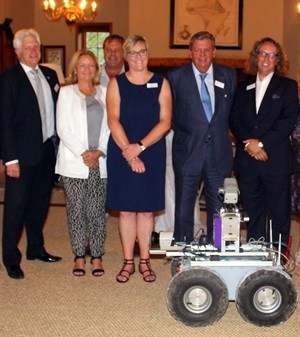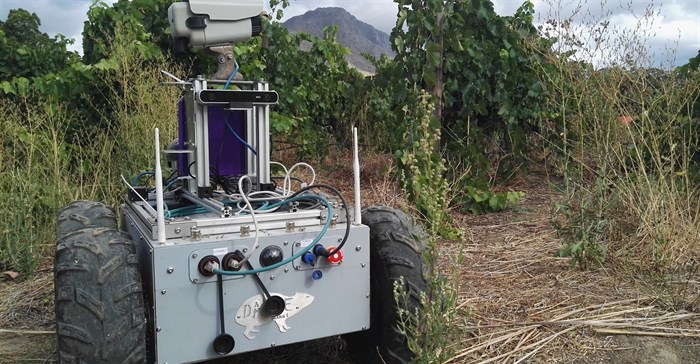
Top stories






More news


Marketing & Media
Ads are coming to AI. Does that really have to be such a bad thing?














To celebrate the IGWS’s fifth anniversary, important role players in the local wine and viticulture industries recently gathered on the wine estate L’Omarins of business leader and Stellenbosch University (SU) chancellor Dr Johann Rupert. The chair of the IGWS board, Dr Marius Lambrechts of Distell, and the acting dean of the SU Faculty of AgriSciences, Prof Danie Brink, both emphasised how important the financial backing, advice, and support from industry have been in the successes of the IGWS and partners such as SU.
“The way in which the IGWS has been able to connect and work together with industry to promote innovation and collaboration has become a model that the Faculty of AgriSciences and Stellenbosch University at large would like to emulate,” Prof Brink added.
The host of the evening, Dr Johann Rupert, and other industry leaders were among the driving forces behind the IGWS’s establishment. He expressed strong concern over the marketing of South African wines overseas. He was also worried about the sustainability of the local wine industry in light of factors such as climate change, droughts, political changes, the continued presence of grapevine leafroll virus and consumer demand for wines with lower alcohol levels.
He pledged further support to the activities of the IGWS and challenged academics and researchers to be innovative and forward-thinking regarding issues pertaining to the local industry. “We need you to do relevant work so that we, as producers, can be ethical in everything we do – from the vineyards to our cellar practices,” was his challenge.
An important part of the IGWS’s endeavours is the sharing of relevant research findings and information about best practices with winemakers, viticulturists, producers, marketers and the media. This is done on a range of topics from drought support and water management to the best pruning methods. The IGWS website has become something of a virtual handbook and source of news and information for the industry. Support during industry information days, a regular newspaper, monthly e-mailed newsletters, books and fact sheets are also part of this information package.
The Institute does not fund specific research projects directly but supports the expansion of infrastructure that makes such endeavours possible. In this regard, it has recently funded new equipment and the expansion of facilities in the SU Department of Viticulture and Oenology (DVO). The IGWS also invests in additional human resources to support research endeavours, consequently, 17 additional staff members have been appointed at SU since 2013.
These facilities and extra pairs of hands are making it possible for SU researchers to test and develop technologies such as drones and handheld sensors. They also test how oxygen, temperature and yeasts influence the quality of white wines in particular. Other topics being investigated include aspects about wine marketing, consumers’ experience of wines and the reaction of vines to changing environmental conditions in light of climate change.
Thanks to the support from Sanlam, the IGWS was able to fund the setting up of an advanced sensory tasting facility at the DVO at Stellenbosch University. Trained panel members now help researchers and winemakers to describe and pinpoint the specific sensory quality (such as mouth feel, aroma, and bouquet) of their wines. Much work is currently being done on Chenin Blanc and Sauvignon Blanc wines.
Sensory analyses were recently done of the ten best wines in the 2016 Standard Bank Chenin Blanc-competition, in an effort to build up profiles of the aspects that set winning wines apart. Similar analyses were done for the FNB Top 10 Sauvignon Blanc wines and the Top 12 Shiraz Challenge wines.
During the function, guests had an opportunity to have a closer look at the IGWS viticulture platform’s flagship project, the Dassie vineyard robot prototype. It carries various sensors that can measure moisture levels, temperature and other stress indicators of a row of vines. The sensors can also test the sugar content and ripeness of bunches of grapes.

SU contracted the Council for Science and Industrial Research (CSIR) in 2016 to build the Dassie’s basic mechanics and sensors according to certain specifications. IGWS staff and associates are now putting the Dassie through its paces, and are investigating its further development and use. It is hoped to commercialise the prototype in collaboration with the SU LaunchLab.
“The vineyard robot is being developed to navigate autonomously through a vineyard, and to gather up-to-date high-resolution information thanks to the cameras, sensors, and software it carries,” explained Prof Melané Vivier of the SU DVO. “It can do so for a whole vineyard, only a section of it, a few vines or even just one or two specific bunches of grapes.”
Berno Greyling, a mechanical engineer in the IGWS team, believes that SU is leading vineyard robotics initiatives worldwide. Such robots have the advantage over drones in that they can also survey underneath a vineyard canopy, and their use is not limited by legislation.
The mobile sensors developed for the Dassie vineyard robot could also be used on a drone or even mounted on the back of a four-wheel motorcycle. “The technology being developed for the Dassie will not only benefit the wine and grape industries but could also be used by other agricultural sectors,” Prof Vivier added during her overview of the IGWS’ endeavours.
She sees the Dassie as a prime example of how the IGWS has been able to help academics at SU and at other institutions to take a new look at their endeavours and their links with industry. “Industry representatives have been part of our focus groups right from the start, and provide regular input about what they’d like such a robot to do,” said Prof Vivier.
A centre for innovation is the next item on the SU academics’ wish list. According to Prof Vivier, such a centre could improve the transfer of knowledge to the industry, and help to commercialise technologies being developed thanks to IGWS funding.